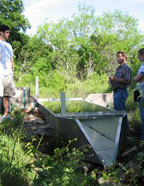|
|

GEO 302C: Climate: Past, Present and FutureAn introductory undergraduate course for non-majors who wish to have a correct understanding of the Earth's climate history and state. Want to know more about Ice Ages, Global Warming, Climate Change and Climate Variability, Ozone Depletion, Hurricanes, Jet Streams, El Nino and La Nina, Southern Oscillation, Intertropical Convergence Zone, Upwelling and Downwelling, Feedbacks, Greenhouse Gases, Weather Forecasting and Climate Prediction? Take this course! GEO 302E: Earth, Wind and FireAn introductory undergraduate course for non-majors GEO 302: Sustaining a PlanetAn introductory undergraduate course for non-majors GEO 387H: HydroclimatologyA course for any graduate students and/or senior undergraduates who wish to have an in-depth understanding of how Earth's climate and hydrological cycle work. The prerequisites are basic college level math and physics, and an interest in interdisciplinary science. You will obtain hands-on experience in a variety of computer climate models! You will develop an analytical skill that benefits your future academic and professional career! GEO 387H: Physical ClimatologyA course for any graduate students or upper-division undergraduate students. This course investigates the nature of Earth’s climate and examines the physical processes that maintain our climate system. Topics include the energy balance, the hydrological cycle, general atmospheric circulation, and how they all interact and vary at various spatial and temporal scales. Human-induced modifications to the climate system, such as urbanization, anthropogenic global warming, desertification, and tropical deforestation, are discussed. Descriptive, analytical, programming, and modeling skills will be taught as well. Prerequisites: A working knowledge of calculus (e.g., M408M) and physical sciences (e.g., PHY 303K) will be assumed, as well as computer skills in computation and graphics. It will be assumed that students will at least be acquainted with some of the basic physical principles of atmospheric science through courses such as GRG 301G (Weather and Climate), or GRG 333C (Severe and Unusual Weather) or GRG 356T (Climate Change). GEO 391: Land-Atmosphere Interaction DynamicsA course for any graduate students who are interested in conducting research in land-atmosphere interaction, land surface modeling, climate modeling, hydrology, water resources, and related topics
Goals:
To provide an introduction to the role of land in weather and climate systems.
Topics:
Basics of terrestrial surface energy, water and carbon balances.
Micrometeorology and atmospheric boundary layer. Theory, modeling, and
observations. Spatial scales: point scale (meters) to global. Temporal scales:
seconds to centuries. Example: the NCAR Community Land Model. This course investigates the nature of Earth’s climate and examines the physical processes that maintain our climate system. Prerequisites: A working knowledge of calculus (e.g., M308M) and physical sciences (e.g., PHY 303K) will be assumed, as well as computer skills in computation and graphics. It will be assumed that students will at least be acquainted with some of the basic physical principles of atmospheric science through courses such as GRG 301G (Weather and Climate), or GRG 333C (Severe and Unusual Weather) or GRG 356T (Climate Change), and an interest in interdisciplinary processes.
|